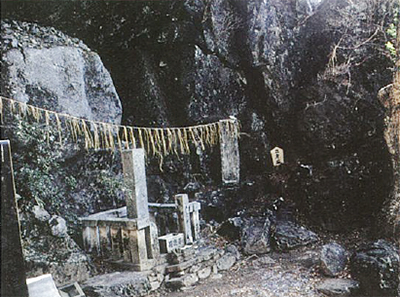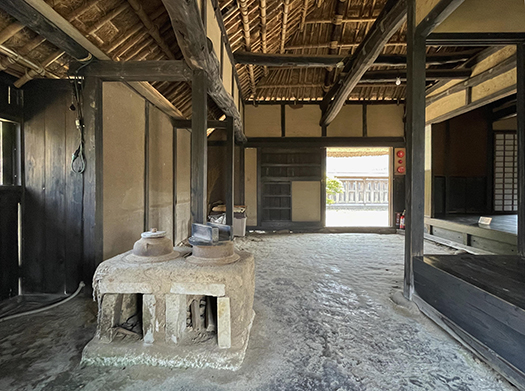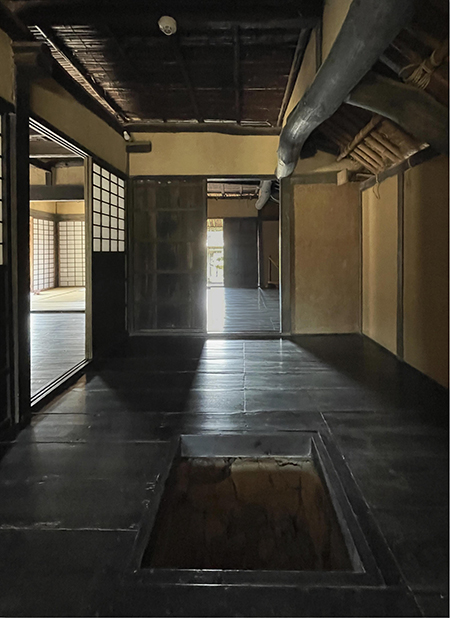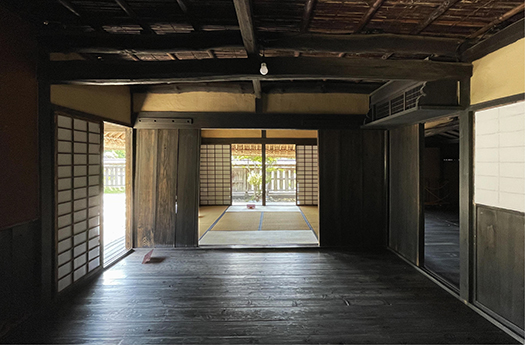


間宮林蔵の生家は茨城県のつくばみらい市にある。ようやく夫婦に授かった子として間宮林蔵はこの世に生を受け、父母の深い愛に包まれていのちを育んでいった。幼い頃から算術などに才の片鱗を見せ、村では神童と言われていたという。そして林蔵13歳の時、ある一晩、ふらりと家を出て翌朝になってようやく帰ってきたのだという。どうしたのかと親が尋ねると「出世を筑波山に祈願してきた」と。
筑波山は、関東地域では富士山と同様に「霊山」として信仰の対象とされてきた。そういった素朴な信仰心に基づいて願を掛けたのだろうけれど、出世という願が印象的。ふつうに考えれば農家の跡取り息子として農事に精を出すのが常識なところ、出世を祈願したというのはどんな背景なのか。
かれが13歳だった当時(1792年)は、1783年に北海道島について仙台藩士が「赤蝦夷風説考」を著していわゆる「北辺」防備への感心が高まり、1785年には幕府による第1回「蝦夷地調査隊」が派遣され、樺太の海岸線にまで調査隊が送られた時期。やがて明治開国に至る幕末の動乱が点火して行った時期といえる。帰農した家系とは言え、武家としての矜持をもち、自分自身の才を社会に役立てたいと考えたものか。
その翌年には地元の算術家の門を叩いて本格的に学ぶ。それは地学・土木の解析へと役立てられ、地域の農業土木工事に際して、工学的に優れた「解」を提案して、幕府の土木技官からその才を認められることに繋がっていったとされている。永く続いた鎖国体制、平和主義から否応なく、列強による国際動乱の渦が日本社会に迫っていることを、本能的に感受して国防に身を捧げたい「出世」したいと考えたのか。出世とはなにかメリットを享受したいというのではなく、純粋に社会の発展安寧に寄与したい、そのために自分の才を活かしたいと考えたのだと思える。かれの人生にはそういう意思が感じられる。

そういった林蔵の心事を、ふだんの話し方などを通じて垣間見ていた両親のことを想像してみると、こちらも深くこころに染みてくる。神に願掛けしてようやく授かった、深い愛情の対象としてのわが子。成長するにつれ社会に強い関心を持ち、自分自身のいのちをそういう公的な使命に使いたいと考えることについて、どういう心境であったか、と考える。
現代のわれわれとはやはりこの時代の日本人は違う価値判断でいたことは疑いがない。少年らしい正義感とか、愛国心とかという形而上的な部分、いわば「奉公」意識に殉じるこころを思わされる。わが子を深く愛し、その心根のすこやかな発露も受容していたに違いない。
家と家系、親と子。そういう部分に思いが募ってくる。
English version⬇
The Boy Who Prayed All Night for a “Career” – Rinzo Mamiya’s Birthplace – 4
Amidst the tension in the northern part of Japan, a boy with a gift of science and technology thought of “promotion” to serve the world with his life. What were his parents’ thoughts as they watched over him? ……
Rinzo Mamiya’s birthplace is located in Tsukubamirai City, Ibaraki Prefecture. Rinzo Mamiya was born into this world as the son of a married couple, and his life was nurtured by the deep love of his parents. From an early age, he showed glimpses of talent in such areas as arithmetic, and was called a child prodigy in his village. One night, when Rinzo was 13 years old, he left home on a whim and finally returned the next morning. When his parents asked him what was wrong, he told them that he had gone to Mt.
Mt. Tsukuba, like Mt. Fuji, has been the object of faith as a “sacred mountain” in the Kanto region. Tsukuba has been the object of religious belief as a “sacred mountain” in the Kanto region, similar to Mt. What kind of background could have led him to pray for success in life, when it would normally be common knowledge that he would devote himself to farming as the son and heir of a farm family?
In 1783, when he was 13 years old (1792), a Sendai samurai wrote a book titled “Akaeyesi Fusetsu Kou” about the island of Hokkaido, which raised interest in defending the so-called “north side.” In 1785, the shogunate dispatched the first “Ezo Survey Party,” which included a survey party to the coastline of Karafuto. This was the period that ignited the upheaval at the end of the Edo period that eventually led to the opening of the country to the outside world in the Meiji era. Although his family had returned to farming, he was still proud to be a samurai and wanted to use his talents for the benefit of society.
In the following year, he entered a local school of arithmetic and began to study in earnest. This was used to analyze geology and civil engineering, and he is said to have proposed a superior engineering “solution” to a local agricultural engineering project, which led to his talent being recognized by the civil engineers of the Shogunate. The long-lasting isolationism and pacifism of the shogunate led him to instinctively realize that the vortex of international upheaval by the powers of the world was approaching Japanese society, and he wanted to devote himself to national defense and “rise in the world”. It seems to me that he did not want to enjoy the benefits of success in life, but rather he genuinely wanted to contribute to the development and peace of society, and to utilize his talents for that purpose. I can sense such a will in his life.
Imagining the parents who had caught a glimpse of Rinzo’s mind through the way he spoke in his daily life, we are also deeply moved. Rinzo’s child, the object of their deep affection, was finally given to him after praying to the gods. As they grew up, they developed a strong interest in society, and I wonder how they must have felt about the idea of using their own lives for such a public mission.
There is no doubt that the Japanese of that era had different value judgments than we do today. It makes me think of a boyish sense of justice, patriotism, and other metaphysical aspects, a mind martyred by a sense of “servitude,” so to speak. He must have deeply loved his own child and accepted the gentle outpouring of that love.
Family and lineage, parent and child. This is the part of the story that makes me think of the family and its lineage, the parents and their children.
Posted on 5月 18th, 2023 by 三木 奎吾
Filed under: 住宅取材&ウラ話, 歴史探訪







コメントを投稿
「※誹謗中傷や、悪意のある書き込み、営利目的などのコメントを防ぐために、投稿された全てのコメントは一時的に保留されますのでご了承ください。」
You must be logged in to post a comment.